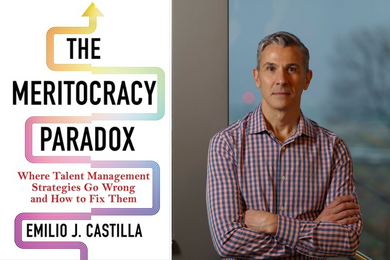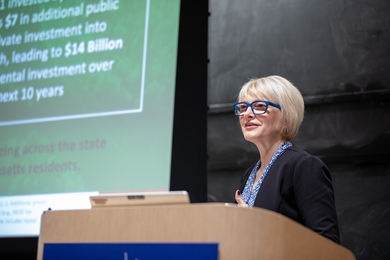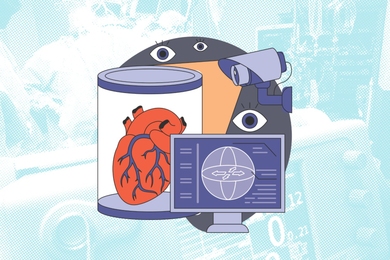Four MIT professors took part in an intellectual summit on "Frontiers of the Mind in the 21st Century" at the Library of Congress from June 15-17. Other participants included three former faculty members and a member of the MIT Corporation.
During the symposium, the first in a series of events in Washington marking the bicentenary of the nation's library in August 2000, scholars from around the world surveyed the status of 24 disciplines and speculated on future developments.
MIT presenters were Steven Pinker, professor of brain and cognitive science and director of the Center of Cognitive Neuroscience, and Eric S. Lander, professor of biology and director of the Whitehead/MIT Center for Genome Research. MIT commentators were Institute Professor Jerome I. Friedman, co-winner of the 1990 Nobel Prize in physics, and Institute Professor Emeritus Robert M. Solow, the 1987 Nobelist in economics.
Other participants with MIT connections included former MIT Institute Professor David Baltimore, co-winner of the 1975 Nobel prize in biology, now president of the California Institute of Technology; former faculty member Marcia McNutt, now president and chief executive officer of the Monterey Bay Aquarium Research Institute in California; historian Thomas P. Hughes, formerly a visiting professor; and Dr. Frank Press, a life member of the MIT Corporation and president of the National Academy of Sciences.
Scholars taking part in the symposium also included British Astronomer Royal Sir Martin Rees; Nobelists Gerald M. Edelman, a neurobiologist, and Leon M. Lederman, a physicist; Harvard sociologist Daniel Bell; University College anthropologist Mary Douglas; US poet laureate Robert Pinksy; computer scientist Raj Reddy; and Sens. Richard Lugar (R-IN) and Paul Sarbanes (D-MD).
UNIFYING KNOWLEDGE
During the past century, the computational theory of mind was "the central conceptual breakthrough in psychology," said Professor Pinker. "Physiological psychology and neuroscience have discovered that all mental activity is incarnated as physiological processes in brain tissue. The cognitive revolution (in mid-century) showed that the realm of the mental -- symbols, meanings, narratives, rules, images -- can ultimately be explained in physical terms because they are species of information that can be implemented as patterns in bits of matter and manipulated to yield meaningful new outputs in the process we call computation."
However, "one major dichotomy persists in the landscape of human knowledge," said Professor Pinker, describing it in several ways: "matter versus mind, biology versus culture, nature versus society. In some ways, the progress of psychology in the past century can be seen as the building of a bridge across this last chasm," he told the Frontiers of the Mind symposium.
In the next century, "psychology will be instrumental in completing the unification of human knowledge," Professor Pinker said. Three new "boundary" disciplines -- cognitive neuroscience, behavioral genetics and evolutionary psychology -- "have the potential to clarify and eventually eliminate the stultifying dichotomy between nature and nurture, genes and culture, innateness and learning."
ORGANISM SIMILARITIES
Like Professor Pinker, Professor Lander sees unification of knowledge as a major theme in the 21st century -- in his case, in the field of genetics. "Seemingly disparate scientific fields are now being seen as simply different perspectives of a common underlying whole," Professor Lander told the "Visions of the Mind" symposium.
He said "reading complete genomes is providing biologists with complete descriptions of the fundamental building blocks of life, akin to the way in which Mendeleev's periodic table provided chemists with a completed description of the elements of matter." Completingbiology's periodic table, he predicted, will allow scientists to take "global views of biological processes... The advent of such global perspectives will cause biology to become an information-driven science, with theory playing a much larger role in the next century than in the last.
"The ability to read individual genes in the 1980s and complete genomes in the 1990s has sparked a final scientific unification: a recognition of a startlingly similarity at the molecular level among all living organisms," Professor Lander said. As an example of the essential "conservatism" of evolution, he pointed out that the genes regulating cell division in yeast and cell proliferation in humans are now thought to have had a common ancestor 1.5 billion years ago.
He suggested that "it will clearly become routine to characterize species by sequencing their complete genomes. If technology maintains its current pace of advance, it may even become routine to characterize individuals within a species in this manner."
THE FINAL THEORY
"It's far from obvious that we will ever discover a final theory embodying the most basic laws of nature," said Professor Friedman, commenting on a paper presented by Professor Lederman of the Illinois Institute of Technology, director emeritus of the Fermi Lab. Professor Friedman identified string theory as "our best candidate [for a final theory]... and the subject of enormous excitement and effort."
But, he asked, "how would we recognize a final theory? It is most likely that our ultimate theory would have to be validated by extrapolation to lower energies. However, it is questionable whether we will ever be able to demonstrate uniqueness in the theory or itsextrapolation."
He pointed out that a powerful criterion in establishing a final theory is "logical isolation." What this means is "...a theory that is so rigid that there is no way to change even a small amount without the theory leading to logical absurdities. From this point of view, we do not end up with the final theory but a final theory. We can ask for no more if the theory fits all observations and has internal consistency. Finding it would be a monumental achievement of humankind.
"Would a final theory be a theory of everything?" Professor Friedman asked. The challenge of this question is "so daunting that it is and probably will remain a philosophical problem."
TRANSCENDING KEYNES
Commenting on a paper delivered by Professor Michael Woodford (SB 1983, PhD) of Princeton University, editor of the forthcoming Handbook of Macroeconomics, Professor Solow suggested three reasons for the continuing controversy surrounding macroeconomics:
- ������Because the field "is closely related to... issues concerning the role government should play in regulating the economy, 'civilians' [non-economists] see macroeconomics as controversial because it is mixed up with ideology."
- "The rules governing human behavior are not immutable. Expectations play a key role in macroeconomics," Professor Solow said, "and they are not measurable."
- "Because you cannot make experiments and because there are not even long-runs of observations" that have taken place in a stationary environment under similar conditions.
The full program of "Frontiers of the Mind in the 21st Century" is available in a video archive, which may be accessed at http://www.connectlive.com/events/libraryofcongress.
The conference was supported by the American Academy of Achievement and the Heinz Family Philanthropies.
A version of this article appeared in the July 14, 1999 issue of MIT Tech Talk (Volume 44, Number 1).





